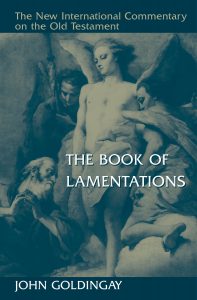Not a Bad Beginning

This afternoon, preparing to read and pray through Lamentations 2 in the morning, I jumped into John Goldingay’s NICOT offering, The Book of Lamentations. I will have to go back and read the introductory material soon. But for now, right into the meat of the poem!
Lamentations 2
The following made me stop for a bit, both for its own merit, and for a failure on my part to grasp a word.
There was a sense in which the temple belonged in the heavens. It linked the earth and the heavens. The earthly temple was a kind of portal. When people entered the temple, they entered Yahweh’s heavenly dwelling. But Yahweh has thrown it down from the heavens to the earth. The Babylonians did not demolish it in the way they demolished the city walls, but they did devastate it in a way that reflected how Yahweh was overturning its significance. So the beclouding meant Yahweh acted in such a way as to indicate that he did not care what happened to the temple and did not bother to think about it. He was not mindful is a litotes: actually, he cared very much, thought a lot, and was quite deliberate in his action.
John Goldingay, The Book of Lamentations p.92
This he wrote in relation to the first verse of the poem: How the Lord in his anger has set the daughter of Zion under a cloud! He has cast down from heaven to earth the splendor of Israel; he has not remembered his footstool in the day of his anger (Lam 2:1 ESV). “He was not mindful” is Goldingay’s rendering of ESV’s “he has not remembered.” Overall, I’m impressed by the initial read of this volume. Great language insight matched with a discerning eye for how we respond to disaster.
Litotes
The word that stumped me in the above quote was “litotes”. Two further times (both on page 100) he uses the word, of “…did not turn back his hand from swallowing up” and “[they] languished/grew weak” (Lam 2:8). I had already determined, after the first occurrence, that I must look up this word, as I was drawing a blank. “Merism” I got (thank you elementary Hebrew classes!), but “litotes”, shamefully, I could not quite bring to mind or work out from context. Merriam-Webster to the rescue:
Litotes is understatement in which an affirmative is expressed by the negative of the contrary (as in “not a bad singer” or “not unhappy”). Well, that makes sense of the opposing statements in the quote! He cared. He cared a lot. This action was anything but reckless or unconsidered.
God had warned judgment was coming. His prophets had warned that exile was the end-result of protracted disobedience and syncretism. But they had failed to mind his warning, and now the city lay in ruins, bemoaning its own state (Lam 2:20-22), since none were left willing and able to take up the cry themselves.
As titled, not a bad beginning. For the commentary, that is.





